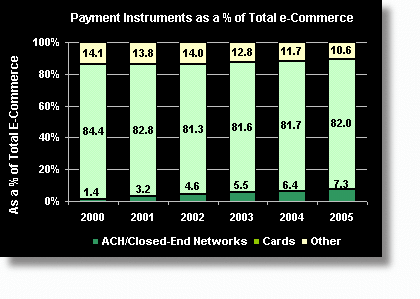Innovation in Internet Payments: The Plot Against Credit Cards
Abstract
Celent Communications predicts ACH and closed-end networks-based payments will capture 7% market share of US e-commerce by 2005. Alternative payment solutions will thrive thanks to "niche markets," which will account for 25% of e-commerce by 2005.
In a new report, Innovation in Internet Payments: The Plot Against Credit Cards, Celent examines the competition between cards and emerging payment solutions in non-recurring Internet payments. Celent predicts non-card solutions will capture 7% market share by in 2005, up from 3% in 2001.

While attempts to displace card instruments have failed miserably in recent years, Celent shows that alternative solutions began to make a significant impact on the Internet in 2001. "Paypal has reshaped the landscape," comments Gwenn Bézard, the author of the report. "The strategy of new contenders consists in piggybacking on existing payment networks and creating proprietary networks to offer better terms and services to merchants at a lower cost than credit cards."
While alternative payment systems originally targeted mainstream retailing, they have been unexpectedly successful in "niche markets" poorly addressed by cards and other instruments. For card associations, the good news is that new entrants have not—so far—targeted fixed-price purchases at top online retailers like Amazon. The bad news is that these "niche markets" —online auctions, online gambling and adult content—are precisely where cards have weak positions. These markets will account for 25% of total e-commerce by 2005, and new entrants are likely to use them as springboards into typically card-dominated territories, e.g., big-ticket retail.
Organizations and payment initiatives reviewed or mentioned in the report include ACHEX, ACI Worldwide, ALACHA, Alltel, Amazon, Amazon Honor System, American Bankers Association, American Express, AOL, Bank of America, Bank of Montreal, Bank One, BB&T Corporation, BCE Emergis, Benz, Billpoint, Canadian Payments Association, Cashedge, Cecoban SA de CV, Certapay, Checkfree, Checkspace, CIBC, Citibank, Conedison, Corillian, C2it, Dell, eBay, eCash, eFunds, Fidelity Investments, First Data, Fleet Boston Financial, Fort Knox National Company, Gardiner Savings Institution, JP Morgan Chase, Electronic Payments Network (UPIC), Flooz, HSCBC, iBill, Intelidata Technologies Corp, Liberty Alliance, LML Payment Systems, Mastercard, Mastercard SPA, Metavante, Mid-America Payment Exchange, Microsoft .Net, Microsoft Passport, MoneyZap, NACHA, NASACT, Navy Federal Credit Union, Federal Reserve of Chicago, Federal Reserve of St. Louis, Network 1 Financial, Pay@Delivery US Postal Service, Paypal, Princeton eCom, Project ACTION, Promeritus, Qpass, Safewww, Inc, Scotiabank, Southwest Corporate Federal Credit Union, SunTrust Bank, SurePay, Symcor, The Vanguard Group, Telecheck, Toronto Dominion Bank, T.RowePrice, Visa, Verified By Visa, Verisign, Veristar Corporation, Wachovia Bank, Wells Fargo, Western Union.

